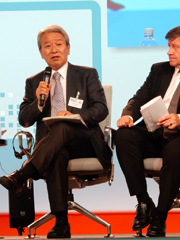On July 7, JICA President Akihiko Tanaka visited Norway and attended the Oslo Summit on Education for Development, where he stressed the importance of quality education.
The conference was organized to address the increasing need for investment in education prior to the Third International Conference on Financing for Development to be held in July in Addis Ababa, Ethiopia, and the United Nations Summit to Adopt the Post-2015 Development Agenda to be held in September. The Oslo Summit aimed to build on the discussion at the World Education Forum held in Inchon, South Korea, in May 2015.

JICA President Akihiko Tanaka serves as a panelist.
Leaders of U.N. agencies; Secretary-General Ban Ki-moon; Malala Yousafzai, 2014 Nobel Peace Prize laureate; and some 40 heads of state and cabinet ministers participated. Four themes for the panel discussions were selected as key agenda items for the 2030 discussion: investment in education, girls' education, quality and learning; and Education in Emergencies. The government of Norway released a chair's statement after the conference.
Tanaka attended the Quality and Learning panel with Brigi Rafini, the prime minister of Niger; Irina Bokova, director-general of UNESCO; Guy Ryder, director-general of the International Labour Organization; and Eric G. Postel, associate administrator of USAID.
Tanaka emphasized the importance of three key linkages in education in improving the quality of education and learning, based on JICA's experiences in educational cooperation: 1. mutual learning opportunities among teachers described with the example of “Lesson Study”*, 2. coherence among curricula, lessons and assessments, which has been a challenge in the education system; and 3. trust built between schools and communities.
In his speech, Tanaka described how Lesson Study has been expanded to 27 countries around the world and how School Based Management programs have been implemented in 16 countries including Niger, with JICA’s assistance. His speech demonstrated that JICA continues to promote mutual learning opportunities for stakeholders as a global advocate.
Discussion after the speeches covered the following: the definition of quality education, education that responds to the needs of society and the economy, education as it relates to employment, community participation and the importance of assessment. Based on JICA's experiences, Tanaka emphasized the importance of lifelong learning among teachers to improving the quality of education as well as the importance of balanced interventions to achieve coherence in education without overemphasizing standardized testing and assessment.




scroll